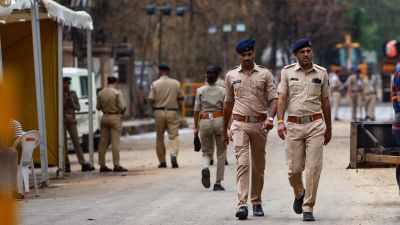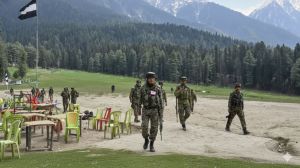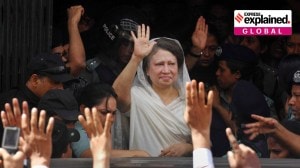Candidates with a cause
The controversial former commissioner of Pune, Arun Bhatia, has decided to contest the Lok Sabha elections from Pune as an independent. Narm...

The controversial former commissioner of Pune, Arun Bhatia, has decided to contest the Lok Sabha elections from Pune as an independent. Narmada Bachao Andolan leader Medha Patkar is considering fighting from Rajapur against the Shiv Sena8217;s former Union minister, Suresh Prabhu.
Bhatia is remembered for the way he fought the land mafia in Pune on unauthorised construction. An upright officer, he was transferred 26 times in 26 years but that did not daunt him, despite the personal hardship and harassment he suffered. It was the outcry against his transfer 8212; candle-light processions, protests, PILs by citizens8217; groups in the city 8212; which led to his reinstatement in 1999. Today, as a candidate for the Lok Sabha, promising the citizens control over the Rs 800 crore budget of the Pune Corporation, the never-say-die bureaucrat echoes the sentiments of a large number of people when he says that we have silently allowed ourselves to be bled by corrupt politicians and bureaucrats.
If she decides to stand, Medha Patkar will also do so as an independent, though an attempt is being made to get the Congress not to field a candidate against her. Former Finance Minister Madhu Dandavate, who represented Rajapur in the past, has urged the Maharashtra chief minister not to put up a candidate against her. For, in a multi-cornered contest, she could end up facilitating the victory of Prabhu, who is a formidable candidate.
This is not the first time that crusading bureaucrats, professionals or activists have decided to take the plunge into electoral politics. There are many reasons why those like Patkar and Bhagat have not been successful in the past. Of course, sometimes people like them give up too quickly if they do not make it in the first round. This happened with those from the JP-led Chhatra Yuva Sangharsh Vahini who contested from Bodh Gaya in assembly elections, though they had done invaluable work organising the most exploited amongst the Dalits of Bihar.
Yet another reason may be that people expect movement groups to transform society but have very different expectations from political parties who they associate with their day-to-day survival issues. This is a subject for greater study.
Though groups who work with deprived sections are respected and loved by them, often their catchment area is not very large or, as in Medha8217;s case, it is spread over several constituencies. Because they often focus their energies on the problems of the most exploited, there is either a tendency to forget other sections who are also part of the constituency they hope to represent or they are not able to reach out to them. While Medha is leading the agitation against the Narmada dam, she will have to contend with other issues of bijli, sadak, paani, for which many believe big dams are important. She will have to fight to change these aspirations and build equations with other sections which can add up to a winning electoral combination.
Or she will have to rely on an existing political formation. Today Medha wants to fight the communal forces represented by the BJP and its allies. Yesterday others had wanted to fight the authoritarian tendencies of the Congress. Beyond that, she and others find the character of all parties the same. The truth is that those who want to work in the existing set-up will have to fashion some kind of a relationship with it. If, for instance, the Congress is to leave a seat vacant for Medha because she wants to defeat the BJP, the Congress would legitimately want to know whether Medha would support the party on bills or confidence motions which can go against the party, even if it agrees to let her speak freely on other issues. Otherwise, why should it sacrifice a seat for her?
What brings people like Medha and Bhagat to electoral politics is a feeling that they need to be more effective in fighting corruption, ensuring transparency and accountability and transforming the system. They do not realise how quickly the system will either marginalise them or co-opt them. That is why some activists have either left politics or used the system to become successful, like Laloo Yadav did. He was associated with the JP movement.
In our system, those who do not want to associate themselves with any party will be lone voices in Parliament, even if they manage to win and succeed in highlighting the issues close to their hearts. In any case, fighting elections is another ball game altogether, not wholly dependent on popular goodwill.
If they consider all parties corrupt, they will have to forge new political instruments over a period of time. Magsaysay award winner Aruna Roy, a colleague of Medha in the recently formed People8217;s Political Front of several movement groups, has opted for a bottom-up approach and plans to field members of her Mazdoor Kisan Shakti Sanghathana in the panchayat elections due in Rajasthan next year. It will be an experiment to watch.
One thing is clear. Successful or not, Patkar and Bhagat are straws in the wind: they represent the stirrings all around for a new politics.
- 01
- 02
- 03
- 04
- 05































